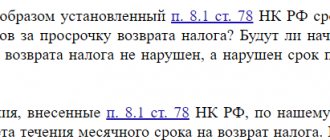You can send a claim to the address specified in the contract, including by email
Paragraphs 4, 5, 9 of the Review describe under what circumstances the pre-trial procedure is considered to be observed. The company filed a claim with the arbitration court against the company to collect a penalty. The first instance left the application without consideration, considering that the plaintiff did not try to resolve the problem before the trial. Leaving the claim without consideration, the AC proceeded from the fact that the claim was sent to the company at the address specified in the contract, and not at the legal address.
The appellate court did not agree with this and returned the case for retrial, and the cassation court confirmed the correctness of this decision:
- The Arbitration Procedure Code of the Russian Federation does not establish to what address the claim should be sent.
- Rules Art. 1651 of the Civil Code of the Russian Federation on legally significant messages are applied unless otherwise provided by law or the terms of the transaction or does not follow from custom or from practice established in the relationship between the parties (Part 2 of Article 1651 of the Civil Code of the Russian Federation).
- In accordance with paragraph 63 of the resolution of the Plenum of the Armed Forces of the Russian Federation dated June 23, 2015 No. 25, taking into account the provisions of Part 2 of Art. 1651 of the Civil Code of the Russian Federation, a legally significant message addressed to an individual entrepreneur or legal entity is sent to the address from the Unified State Register of Individual Entrepreneurs/Unified State Register of Legal Entities or to the address indicated by the defendant himself.
Thus, the pre-trial procedure is considered to be complied with if the claim is sent, including to the address specified in the contract.
The court came to the same conclusion in a case where the plaintiff sent a claim to the defendant at the email address specified in the contract (clause 5 of the Review). The agreement between the organization and the company stipulates that a claim can be submitted in one of the following ways: fax, e-mail or international courier service. The agreement specifies the company's email address.
Thus, the parties clearly and unambiguously established in the contract that the claim can be sent, including by email. The organization's statement of claim was accompanied by documents confirming the filing of the claim in this manner. Consequently, this indicates compliance with the pre-trial procedure for resolving the dispute.
In paragraph 9 of the Review, the Supreme Court of the Russian Federation noted that sending a pre-trial claim exclusively by a valuable letter with a list of attachments is not mandatory, unless otherwise provided by law or contract. The current legislation does not contain such a requirement.
Is it possible to collect debt for housing and communal services from an old-age pension and in what amount?
“The Supreme Court clarified the procedure for mandatory pre-trial regulation of arbitration disputes”
The Presidium of the Supreme Court approved a review of the practice of application by arbitration courts of the provisions of procedural legislation on mandatory pre-trial dispute resolution. The document contains 18 legal positions and was prepared in order to ensure uniform judicial practice, as well as to eliminate conflicting approaches when considering similar cases.
Lawyer at Kachkin and Partners Law Firm Olga Duchenko assessed the review generally positively. According to her, she has repeatedly encountered situations where unscrupulous opponents have turned the pre-trial procedure for resolving a dispute into a tool for delaying its resolution. “For example, they argued that it was necessary to send a claim, although in fact compliance with the claim procedure was not mandatory for this category of dispute. In this review, there is a tendency to move away from excessive formalism when deciding whether the claimant has complied with the claim procedure, and thus the Supreme Court of the Russian Federation cuts off unnecessary literalism,” she is convinced.
Viktor Glushakov, partner of JSB "KRP" of the Chelyabinsk region, called the document very useful. “Almost every clarification removes many questions, the answers to which seem to be clear, but despite this, controversial situations regularly arise about them,” he believes.
In paragraph 1 of the review, it is noted that the legislation of the Russian Federation does not provide for a mandatory pre-trial procedure for resolving a dispute regarding a request to foreclose on pledged property.
Based on clause 2, compliance with the pre-trial procedure for resolving a dispute regarding a claim for recovery of expenses for the maintenance and repair of the common property of an apartment building in the Russian Federation is mandatory. As follows from paragraph 3 of the review, part 5 of Art. 4 of the Arbitration Procedure Code of the Russian Federation does not provide for the obligation to comply with the pre-trial procedure for resolving a dispute regarding a claim for compensation for harm (Chapter 59 of the Civil Code of the Russian Federation).
According to clause 4, the pre-trial procedure is considered to be complied with when sending a claim, including to the address specified in the contract. The next paragraph of the document notes that sending a claim to the defendant’s email address, if such a procedure is clearly and unambiguously established in the contract, indicates compliance with the pre-trial procedure for resolving the dispute.
Viktor Glushakov noted that the “legalization” of the ability to send a claim by email is a long-awaited clarification for many lawyers. “It can be interpreted broadly, allowing for the possibility of exchanging by e-mail not only claims, but also generally expanding the approach to electronic document management, which does not require special keys, etc.,” he believes.
Olga Duchenko noted that in practice, entrepreneurs often do not check the legal address of the defendant in the Unified State Register of Legal Entities, which could have changed, but are guided only by the provisions of the contract.
Paragraph 6 of the review explains that compliance with the pre-trial procedure for resolving a dispute when the insurer files a subrogation claim is not required if such a procedure has been followed by the insured.
It follows from clause 7 that the assignee is not required to comply with the pre-trial procedure for resolving the dispute if such a procedure was followed by the original creditor before notifying the debtor of the assignment of the right. Olga Duchenko called this conclusion very logical, since it is inappropriate to submit a claim twice for the same requirement.
Clause 8 explains that the arbitration court should return the claim on the basis of clause 5, part 1, art. 129 of the Arbitration Procedure Code of the Russian Federation, if by the day a person applies to court (sending a claim by mail, submitting documents to the court office, submitting documents by filling out a form posted on the official website of the court), the period established by law or contract for the pre-trial procedure for resolving the dispute has not expired and there is no response to the complaint.
Stanislav Matyushov, a senior lawyer in the arbitration practice of the VEGAS LEX law firm, believes that such a position will be positively received by courts with a high workload, since it is quite easy to check compliance with the deadline for pre-trial settlement of a dispute by comparing the terms of the contract or the law with the date of filing the claim. “This clarification does not directly contradict established judicial practice on the absence of grounds for leaving a claim without consideration if, after accepting the claim for proceedings, it is established that the defendant’s behavior did not indicate an intention to resolve the dispute pre-trial (as a rule, by the date of the preliminary court hearing, the consideration period the claim expires),” he explained.
Olga Duchenko expressed disagreement with the explanation. “Of course, formally it complies with the law. However, the purpose of the pre-trial claim procedure is to resolve the dispute between the parties as quickly as possible without court intervention. If the prospects for a voluntary settlement of the dispute in pre-trial proceedings are zero, the behavior of the defendant clearly indicates that he has no intention to resolve the dispute voluntarily, the claim has been accepted for consideration, and the party has not responded to the claim, in my opinion, this should be taken into account. Let me remind you that earlier the Supreme Court of the Russian Federation explained that “failure to comply with the claim procedure cannot be an unconditional basis for leaving a claim without consideration, since such a decision can lead to unreasonably delaying the resolution of the dispute and infringement of the rights of one of its parties” (clause 4 of section II Review of Judicial Practice of the Supreme Court of the Russian Federation No. 4, approved by the Presidium on December 23, 2015),” the expert explained.
In paragraph 9 it is noted that sending a pre-trial claim exclusively by a valuable letter with a list of attachments is not necessary, unless otherwise provided by law or contract. According to paragraph 10 of the review, if the legislation establishes only the minimum and maximum limits of compensation for violation of exclusive rights, which can be recovered by the court, then the pre-trial procedure for requesting such compensation is followed if the claim contains an indication of the substantive legal dispute to be resolved and a proposal for its settlement.
In accordance with clause 11 of the document, a discrepancy between the amount of the principal debt, the amount of the penalty, the interest indicated in the claim and in the lawsuit, including due to an arithmetic error, does not indicate non-compliance with the claim procedure for resolving the dispute. According to Olga Duchenko , the main thing is that the claim should indicate the circumstances on which the claims are based.
Clause 12 explains that the use of negotiations, mediation or other conciliation procedure indicates that the parties have taken measures to resolve the dispute pre-trial only if the agreement established such a procedure.
In paragraph 13 it is noted that failure to submit with the claim documents confirming the plaintiff’s compliance with the pre-trial procedure for resolving the dispute, if it contains information about such documents, is grounds for leaving it without progress.
Clause 14 explains that the limitation period is suspended for the period of actual compliance with the claim procedure (from the moment the claim is submitted until the moment it is refused). Failure to receive a response to a claim within 30 days or the contractual period is equivalent to a refusal to satisfy the claim received on the 30th day or on the last day of the period established by the contract. Rule clause 4 art. 202 of the Civil Code of the Russian Federation on extending the limitation period to 6 months concerns the circumstances listed in paragraph 1 of Art. 202 of the Civil Code of the Russian Federation. According to Viktor Glushakov, this clarification is extremely useful for practice and eliminates many questions.
It follows from clause 15 that compliance with the pre-trial procedure for resolving a dispute regarding claims that were changed after filing a claim in accordance with Art. 49 of the Arbitration Procedure Code of the Russian Federation (for example, in the case of partial repayment by the defendant of the resulting debt, an increase in the amount of claims by adding a new billing period, or due to an increase in the number of days of delay), is not required if such a procedure was followed in relation to the initially stated claims.
Viktor Glushakov called the explanations of this paragraph interconnected with paragraph 11 of the review, since both of them relate to the issue of compliance with the claims procedure in the event of a change in the amount of claims in court. “In my practice, judges have repeatedly required plaintiffs who increase claims to send new claims to the defendant,” he noted.
In paragraph 16 it is noted that when the proper defendant enters the case or involves a co-defendant (second defendant) in the case, compliance with the pre-trial procedure for resolving the dispute in relation to these persons is not required. If the court finds that the plaintiff, being aware of the proper defendant, deliberately filed claims against another defendant in bad faith, trying to extract any unjustified advantages from this, or the newly involved (entered into the case) defendant proves that he had the intention settle the dispute in a pre-trial procedure, but was deprived of such an opportunity, then the court has the right to impose all legal costs on the plaintiff, regardless of the results of the consideration of the case on the basis of Art. 111 Arbitration Procedure Code of the Russian Federation.
Stanislav Matyushov noted that this issue was controversial until a certain time and was resolved ambiguously by the courts. “In some recommendations, the prevailing approach was that failure by the plaintiff to send a claim or other document to the co-defendant involved in the case or to the proper defendant entering the case in order to resolve the dispute does not entail leaving the claim without consideration (see paragraph 3 of the recommendations of the working group of the Arbitration Court of the Ural District for discussion of issues arising in the practice of applying the Arbitration Procedure Code of the Russian Federation, dated November 25, 2021 No. 5/2016; protocol decision No. 42 of the Presidium of the Arbitration Court of the Moscow District dated June 16, 2017). At the same time, the approach of the RF Supreme Court regarding verification of the plaintiff’s good faith seems interesting. Apparently, the plaintiff’s awareness of the proper defendant and the latter’s intention to settle the dispute pre-trial can be verified by studying the plaintiff’s correspondence with the proper and improper defendants,” the expert suggested.
Clause 17 explains that if a counterclaim is based on the same legal relations as the original claim, and the substance of the counterclaim is discerned from the content of the response to the claim in the initial claim, then the court may accept the counterclaim without the applicant complying with the pre-trial procedure for resolving the dispute. “The Presidium of the RF Armed Forces allows for the possibility of non-compliance with the claim procedure when filing a counterclaim in the event of the identity of the disputed legal relations. However, I would recommend following it in order to avoid getting into a situation of poor-quality assessment,” noted Viktor Glushakov.
In paragraph 18 it is noted that if in the arbitration court of first instance the defendant did not raise an argument about the plaintiff’s failure to comply with the pre-trial procedure for resolving the dispute, then this argument cannot be considered as a basis for canceling judicial acts in higher authorities.
Zinaida Pavlova
The material was published on the Advokatskaya Gazeta website on July 27, 2020
You can go to court only after the expiration of the period allotted for pre-trial settlement of the dispute
In paragraph 8 of the Review, the Supreme Court of the Russian Federation indicated that the Arbitration Court must return the statement of claim if, by the day the court goes to court, the period established by law or agreement for pre-trial dispute resolution has not yet expired and there is no response to the claim.
An example is given of a case where a company filed a claim with the AS for the collection of debt under a contract. The courts of first and appellate instances rejected the claim, considering that the pre-trial settlement procedure was not followed. The company appealed to the court of cassation, citing the fact that the fact of filing a claim does not interrupt or terminate the period for responding to the claim.
The Court of Cassation did not agree with this: compliance with the claim procedure for resolving a dispute is not only the formal sending of a demand to the defendant, but also compliance with the deadline provided for the response, after which the plaintiff can go to court.
The court's acceptance of the statement of claim before the expiration of the specified period is not consistent with the principle of equality of parties. Consequently, non-compliance with the claim procedure is recognized not only by the lack of evidence of filing a claim, but also by going to court before the expiration of this period.
How to register a claim procedure for resolving disputes in a management system
As a rule, in management contracts, management organizations provide for pre-trial procedures with the following wording:
- “All disputes arising from this agreement or in connection with it are resolved by the parties through negotiations. If the parties cannot reach a mutual agreement, disputes and disagreements are resolved in court at the request of one of the parties.”
- “All disputes between the Parties are resolved in a pre-trial (claims) manner. The claim must be considered by the party receiving it within 30 days from the date of its receipt. If the Parties cannot reach a mutual agreement, disputes and disagreements are resolved in court at the request of one of the parties.”
But such conditions have no legal force and the claim procedure is considered not established in the management agreement.
Properly drawn up terms of the claim procedure in the contract must necessarily contain:
1. Clearly formulated demands to change or terminate the contract, fulfill an obligation, pay a debt or pay interest, etc.
Remember that the current legislation does not limit the parties to the contract in introducing a claim dispute resolution procedure both in relation to all disputes arising from the contract and in relation to specific disputes. Under this condition, even if the owner wishes to go to court, he will have to send a claim to you.
You can provide for a claim settlement procedure in relation to the following most common disputes in the field of management of apartment buildings - claims for (about):
- recovery of material damage caused by the management organization: flooding of apartments, falling snow and icicles from the roofs of houses, etc.;
- challenging the actions of the management organization to limit the provision of utility services;
- carrying out routine repairs in the house;
- transfer of “remains” on the house upon termination of the management contract.
2. Conditions for the provision by the other party of documents substantiating the requirements.
3. The amount of the claim and its calculation – if it is subject to monetary assessment.
Thus, when making demands for recovery of material damage due to flooding of an apartment, it is necessary to provide an appraiser’s report, etc.
We have listed the main conditions that we recommend to include in the clause on claims settlement of disputes in the management agreement. You can provide other conditions necessary for the consideration of claims.
How to protect a management agreement from challenge
Remember
In the Review of the RF Armed Forces on the pre-trial procedure for resolving disputes, there are several more cases and theses that are interesting to management organizations, for example:
- To prove that he has worked to pre-trial resolve the dispute with the defendant, the plaintiff must not only indicate this in his application, but also provide supporting documents. Otherwise, as indicated in paragraph 13 of the Review of the Supreme Court of the Russian Federation, the arbitration court has grounds to leave such an application without progress.
- If in the arbitration court of first instance the defendant did not state an argument about the plaintiff’s failure to comply with the pre-trial procedure for resolving the dispute, then this argument cannot be considered as a basis for canceling judicial acts in the appellate or cassation instance.
Administrative bodies conducting claims work with debtors should take into account the conclusions included in the Review of the RF Armed Forces and use them in their practice.





